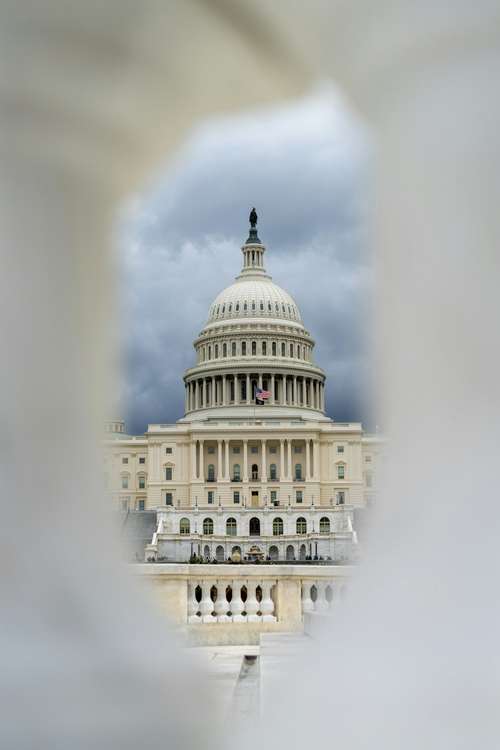Senator Tim Scott is taking a bold step by courting Democrats for his Crypto Bill. His push to gather between 12 to 16 cross-votes from the Democratic side has stirred conversations across Capitol Hill while giving fresh momentum to cryptocurrency legislation. It’s fascinating to see how a single political maneuver can potentially reshape the landscape of crypto regulation. If you’re curious about what this means for digital assets in America, you’re in the right place.
This move by Senator Tim Scott is more than just political grandstanding—it reflects a deep understanding of the need for a balanced approach to blockchain policy. The strategy is simple yet daring: build bipartisan support and ensure that the burgeoning crypto industry receives clear-cut government policy. With this quest for bipartisan support, the US Senate might soon see groundbreaking changes that make the United States a veritable hub for digital finance and financial innovation!
Senator Tim Scott's Strategic Outreach
Senator Tim Scott’s outreach to Democrats marks a distinctive attempt at cross-party cooperation on the Crypto Bill. His strategic discussions are rooted in the belief that strong bipartisan support is essential for any lasting legislative change in government policy related to digital assets. A blend of personal conviction and legislative strategy drives his efforts to bring everyone to the table.
The senator’s approach is no less than a strategic chess move in a high-stakes game; he understands that offering a Crypto Bill with sound and consistent guidelines on cryptocurrencies could win the confidence of party lines resistant to change. Some liken this to building a bridge where once there was a chasm. For many, his initiative is a welcome reminder that cooperative politics can prevail even in contentious environments.
One interesting aspect of Senator Tim Scott’s outreach is his emphasis on creating a regulatory framework that promises stability and clarity. This isn’t just about regulatory catch-up; it’s about establishing an environment where financial innovation can thrive while protecting investors and ensuring fair market practices. In a world shifting towards digital currency, the senator’s backing of a policy initiative like this shows his commitment to fostering safe innovation!
Bipartisan Efforts for Crypto Regulation
At the heart of this legislative strategy is the drive for bipartisan support. Senator Tim Scott isn't merely hoping for token endorsement; he is actively seeking cooperation that spans across party lines. His efforts are eyes on a prize that balances economic growth with robust regulatory measures. This alignment encourages trust and stability, both vital in the fast-paced world of digital finance.
When you consider the challenges the crypto industry faces, it’s clear why bipartisan support matters. Picture two groups on opposite sides of a table working together to balance the scales. That’s exactly what the senator envisions. Through dialogue and collaboration, his aim is to produce clear guidelines that benefit everyone, from blockchain enthusiasts to traditional financial institutions. In some ways, his work mirrors that of skilled mediators who smooth out differences to pave the way for progress.
Moreover, the initiative is designed to address concerns that have long hampered cryptocurrency legislation in the US Senate. By bringing together diverse opinions, the proposed framework under this Crypto Bill would offer not only clarity but also predictability. This is essential because when lawmakers can agree on the basics of crypto regulation, it pumps confidence through the entire crypto industry and reassures investors that the future of digital assets in the US is secure.
This drive for clearer legislative guidelines is expected to have ripple effects across the entire crypto domain. Financial innovation doesn’t occur in isolation, and when government entities take a balanced stance, it empowers market participants to engage in risk-managed expansion of new technologies. The potential growth in blockchain policy and digital currency innovations might well give an industrial boost that resonates long after legislative debates have ended.
Political Opposition and the Road Ahead
Not everyone is cheering for this initiative, though. Critics within the chamber, particularly voices like Senator Elizabeth Warren’s, have raised concerns that the Crypto Bill might not address all underlying issues within the industry. The opposition highlights one of the biggest challenges in any piece of government policy in volatile sectors: how do you tailor regulation without stifling innovation?
In political arenas, the business of compromise often results in both wins and losses, and this instance is no different. While the senator seeks cross-party cooperation, some in the Democratic camp remain skeptical. These critics fear that the new measures, if not carefully balanced, could lead to overregulation that might hinder the growth of digital currency sectors. That said, many see this debate as a healthy sign of a maturing legislative process—one that is ready to be molded by detailed, thoughtful input from both sides of the aisle.
Interestingly, this rascal of a change is not happening in isolation. The current political climate, with its shifting allegiances and strategic negotiations, makes it a fertile moment for efforts that promote constructive policy-making. Regardless of the hurdles, Senator Tim Scott’s outreach is likely to spark deeper discussions on crypto regulation among lawmakers. Even those initially reluctant to endorse a Crypto Bill are starting to consider the benefits of a clear framework that safeguards economic innovation.
At any rate, the unfolding developments serve as a reminder that government policy rarely follows a straight line. It twists, turns, and negotiates its way through fascinating corridors of political collaboration and legislative strategy. The next few months in the US Senate promise to be as dynamic as a live baseball game, where every pitch is met with anticipation and the final score remains a mystery until the last inning.
Looking Forward: A New Era for Digital Assets?
The discussion around the Crypto Bill by Senator Tim Scott could very well signal a turning point for the cryptocurrency landscape in the United States. With the senator’s efforts to foster bipartisan support, the prospects of a robust and dynamic framework for digital currency regulation are on the horizon. This isn’t just about passing another bill—it’s about ensuring that the crypto industry has the regulatory clarity necessary for sustained growth.
Imagine the crypto industry as a bustling city. Without clear laws and roadmaps, chaos can ensue. However, with well-drafted legislation, it becomes a thriving metropolis with safe avenues for investment and innovation. This is the vision that Senator Tim Scott champions: a future where blockchain policy and financial innovation are given equal importance in paving the way for secure and pioneering digital finance.
The eventual success of the Crypto Bill will depend on the fine balance of political will, thorough regulatory drafting, and the inclusive mindset of policymakers across departments. It’s a challenging road, but one that is indispensable in today's digital era. The growing support from numerous stakeholders heralds a sense of optimism, making it one of the most talked-about legislative maneuvers in recent times!
Senator Tim Scott’s initiative opens up an exciting chapter in crypto legislation that many hope will lead to a more secure and innovative market. With the right blend of sensible government policy and collaborative political action, the crypto industry might finally experience the kind of regulatory clarity it has long awaited.
As we watch these developments unfold on Capitol Hill, it’s clear that the conversation on digital assets is only just beginning. The future of cryptocurrency regulation in the US could be transformed by efforts that bring together contrasting views into a single, unified legislative strategy. The road ahead is filled with challenges and controversies, but it’s also paved with the promise of a truly innovative era for digital finance.




